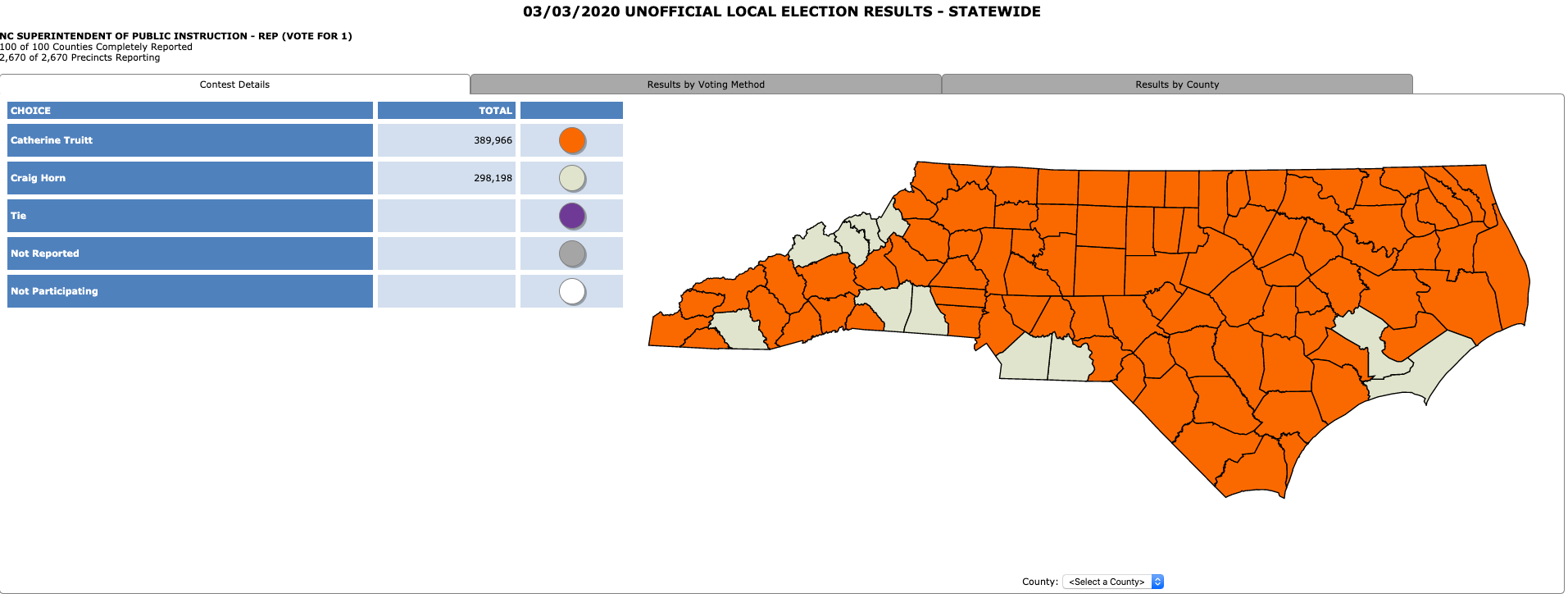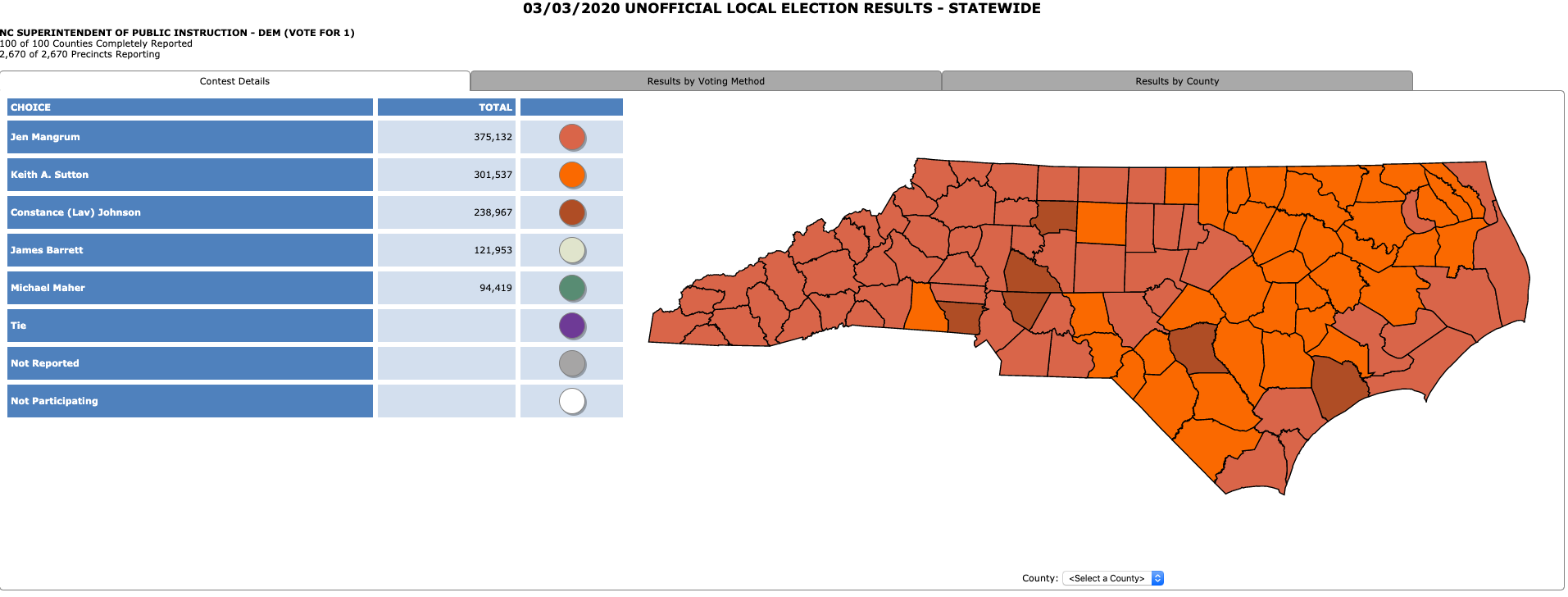
Last year, Mark Johnson announced he would not seek re-election as superintendent of public instruction and instead would compete for the Republican nomination for lieutenant governor. His loss in the primary means that he will exit elected office after the completion of his four-year term as the face of North Carolina public schools. Voters went to polls Tuesday to select the candidates that would vie for the office. In November, North Carolinians will choose between Democrat Jen Mangrum and Republican Catherine Truitt.
Western Governors University chancellor Catherine Truitt defeated Union County Rep. Craig Horn to win the Republican nomination. Truitt captured nearly 57 percent of the vote and won 89 of 100 counties. Horn won his home county, neighboring Anson County, two counties near the coast, and a handful of counties in the west.

University of North Carolina at Greensboro professor Jen Mangrum earned 33 percent of the vote, which was enough to win the Democratic nomination over Keith Sutton, James Barrett, Constance Lav Johnson, and Michael Maher. Sutton, who is a member of the Wake County school board, had an impressive showing with 27 percent of the Democratic vote.
The Democratic contest was unusual. Mangrum lost to Sutton in her home county, Guilford. Sutton lost to Mangrum in his home county, Wake. (I suppose there is truth to the verse that “A prophet is not without honor except in his own town and in his own home.”) Sutton won a huge cluster of counties stretching from the Pee Dee region of South Carolina to eight counties bordering southeast Virginia. Most of these counties have a high percentage of low-income and minority residents. Sutton, who is African American, won all seven of North Carolina’s majority African American counties by large margins. Consultant Constance Lav Johnson, who is also African American, won six counties and captured an impressive 21 percent of the vote.

Money did not appear to be a significant factor on either side. Keung Hui of the News & Observer reported, “Democrat Jen Mangrum and Republican Craig Horn have each raised $50,000 more than their nearest competitor.” But fundraising prowess is not guaranteed to give a candidate an advantage in a down-ballot race in a primary election. Truitt easily defeated Horn despite the fundraising gap. Sutton was competitive with Mangrum despite raising and spending significantly less.
As North Carolina heads into the general election, the superintendent of public instruction race will be one to watch. Both candidates have significant experience in K-12 and higher education but have very divergent perspectives on policy matters. I will detail those differences in the coming months.
What does the superintendent of public instruction do?
According to the N.C. Constitution, the state superintendent is the secretary and chief administrative officer of the State Board of Education. In this capacity, the superintendent serves as a nonvoting adviser to the lieutenant governor, state treasurer, and 11 gubernatorial appointees that supervise and administer North Carolina’s system of public schools. State statute also directs the superintendent to organize and establish a Department of Public Instruction and “have under his or her direction and control, all matters relating to the direct supervision and administration of the public school system.”
Most North Carolinians assume that the elected superintendent of public instruction is the chief of the state’s public schools. After all, “public instruction” is right there in the title, and the superintendent is often the most visible representative of public schooling in the media. But actual governance is anything but clear. In 1993, Gov. James Hunt remarked, “The big problem in education and state government today is that the buck doesn’t stop anywhere.” His observation remains true today.
The superintendent of public instruction, State Board of Education, governor, and General Assembly all play key roles in the state-level support and management of public schools. For example, the superintendent cannot increase teacher compensation or modify Read to Achieve. These measures, which both primary winners support, would require legislation approved by the General Assembly. Of course, the state superintendent can directly or indirectly encourage lawmakers to support bills that align with their goals.
On the other hand, the superintendent of public instruction can use the various offices within the Department of Public Instruction to increase oversight of district and charter schools. Catherine Truitt may not be inclined to enlarge the department’s supervisory role. On the other hand, I suspect that Jen Mangrum will use departmental resources to keep a closer eye on charter schools, given her hostility toward them.
Moreover, the superintendent also may direct their communications staff to craft press releases and other communique that assess legislation, budgets, or regulations that affect public schools. For example, when Democrat June Atkinson served as state superintendent, her communications staff issued press releases to convey concern and displeasure with Republican education budgets. If the Democratic nominee prevails in November and Republicans maintain a majority in the General Assembly, then I expect that practice to resume.
Finally, the superintendent-elect may modify the department itself. Jen Mangrum promised to create an office of equity affairs and hire a deputy superintendent for equity. She also pledged to expand the scope of DPI’s work in early childhood education by starting their work at birth. Truitt hasn’t outlined extensive plans for changing the department but declared that she would go in a different direction than current superintendent Mark Johnson.
Which qualities make for a good superintendent of public instruction?
An article published in the Wilmington, NC Weekly Star on March 20, 1880, described it best,
We hold, after some knowledge of the inefficiency of the office as now organized, that the Superintendent of Public Instruction is as important an office as that of Governor, and that to fill the place ably, thoroughly, efficiently requires more learning, more gifts and more real ability than to fill the office of Chief Executive. We do not suppose that any man of sense who has any proper knowledge of the duties of the two offices will question the correctness of this opinion. To be thoroughly efficient, and to make his office a public blessing, the Superintendent of Public Instruction should be a good writer, a good speaker, a man of vim, of enthusiasm, of great industry and zeal, so that he could do as the Apostle Paul said of the sacred calling to “magnify his office.” A man of the right sort a man of very superior abilities, with a combination of manifold gifts would be a power in North Carolina for good if the law were changed in such particulars as would give scope to his energies and make the whole State his field for public addresses. By circular letters, by newspaper contributions, by personal superintendency, by constant lecturing a man of fire, of energy, of power, could stir North Carolina to the very centre and create such an excitement on the subject of general education as has never been seen or felt in the old State.
Is that too much to ask?




